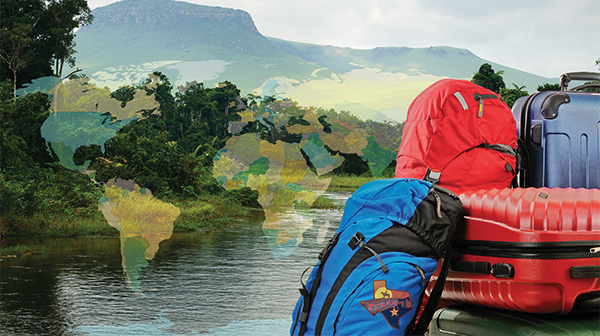
“Our medical director, fellow physicians, physician assistants, and nurse practitioners were all so supportive and covered our remaining shifts,” Dr. Kahn said. “We are hoping to return soon so that we can … say thank you in person.”
Explore This Issue
ACEP Now: Vol 34 – No 07 – July 2015Despite overwhelming support, the Kahns had many concerns about making the move. “We had enough savings to support ourselves for a year without an income, but it was risky to give up jobs we loved so much because we didn’t know if we could get them back,” said Dr. Kahn, who noted that his wife worked at Baylor Medical Center part-time and had been the department’s physician scheduler since 2009.

The Kahn family on a hike in the Lola ya Bonobo nature preserve in Democratic Republic of the Congo.
Diseases and health care were concerns, as well. Anyone entering the Congo must have proof of getting the yellow fever vaccine. It is important to wear insect repellent to avoid malaria because it is transmitted from mosquito bites. “We take Malarone daily to prevent malaria,” Dr. Kahn said. “Our son has had diarrhea, and his stool studies were positive for Giardia, so he is now taking metronidazole.”
The family’s health insurance covers everyone, including Daniel, while in the Congo. “We invested in medical evacuation insurance in case of an emergency,” said Dr. Kahn, noting its affordability. “The health care in the DRC is not at the level of the United States, but there are a few places here that are very impressive.”
Of course, adapting to living in a new country was another challenge. “I was afraid my daughters [ages 7, 5, and 5] could get sick and not have the same health care options we are accustomed to in Dallas,” Dr. Kahn said.
But the family is adjusting well, and each day is getting better. The girls already attended a school and are now getting home-schooled.
Easing a Difficult Transition
Dr. Kahn believes that being employed as an emergency physician made the move to Africa possible. “There may not be a full-time position available as soon as we return, but at some point, I assume something will open up. The nice thing about emergency medicine is that you can pick up shifts at various locations. I could always do some locum tenens work while I wait for our emergency department to have space for us again.”
According to Dr. Kahn, there are 500 other American families in their same situation, but most people cannot quit their jobs and relocate. “Many dads are staying home to work and raise their biological kids, while the moms come here to be with the adopted children,” he said. “I know other doctors who cannot leave their jobs because they have a practice, an office, a patient/referral base, and employees they are responsible for. As emergency medicine physicians, we do not have those responsibilities, and if we leave, we will most likely find work when we return. People will continue to have emergencies, and they will need us to stabilize and manage those emergencies.”
Pages: 1 2 3 4 | Single Page


2 Responses to “Emergency Physicians Leave Jobs in Dallas, Relocate to the Congo for Adopted Son”
August 3, 2015
Sophia HaleemWow, what awesome story thanks for sharing. We adopted from Ethiopia and thank God we did not face this problem. I pray for Kahn’s Family. I am great-full as a ER physician for my flexibility as well
September 9, 2015
Brian WippermannEncouraged by your courage, faith, commitment to your son. Believers are all indeed adopted children of God, so what a beautiful parallel. I was too old for many countries, so our adopted son Stephen (making 6 total) is from 90 minutes away, but with his fire-red hair, looks just as adopted as Daniel! What a blessing. Our prayers for your family added!
Thanks again, Brian (full time EP in NorCal).